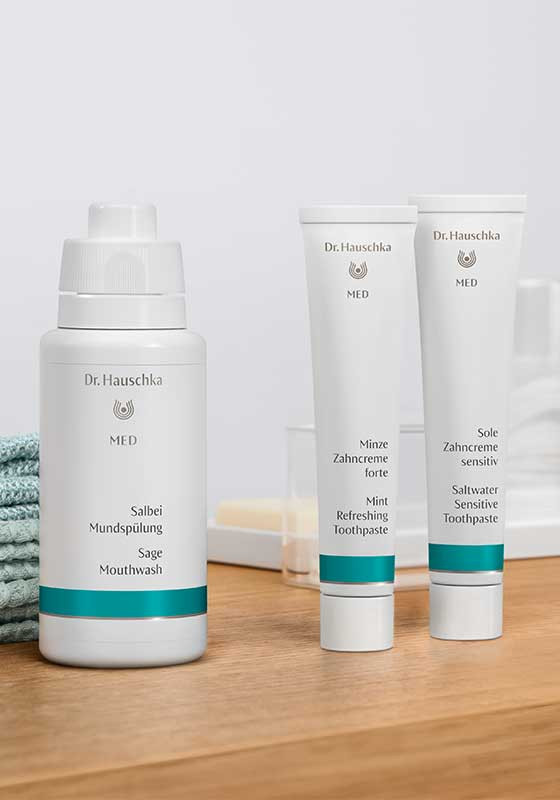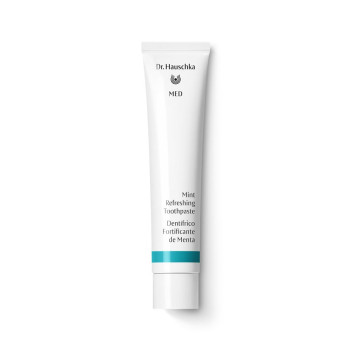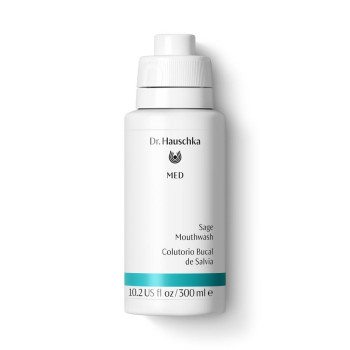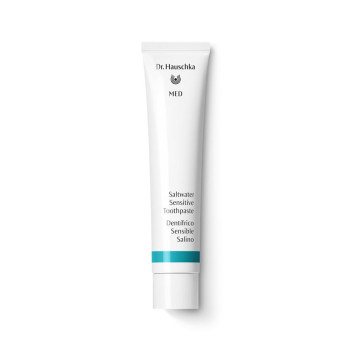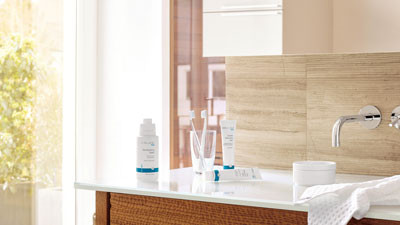Oral and dental care
Healthy Teeth, Healthy Body.
The mouth and teeth have a greater influence on our health than is commonly realized. The condition of the mouth can affect our body in its entirety. Conversely, general illnesses can affect our oral health. For instance, inflammation in the mouth (e.g. of a tooth socket, the periodontal ligament or jawbone) can enable bacteria to find its way into the bloodstream and penetrate even distant areas of the body where they can aggravate an existing illness. On the other hand, a metabolic disorder like diabetes can promote inflamed gums (periodontitis). The good news is that scientific studies have shown that effective treatment by a Periodontist can positively affect diabetics.
| Med Tip Please tell your doctor and dentist if your gums are inflamed or you have a dry mouth. |
Recommendations and Tips for Healthy Teeth and Gums
The Right Diet for Healthy Teeth.
Food can improve our health, but it can also damage it. By being aware of what is healthy and unhealthy, the teeth and gums can be protected and fortified.
Foods that are rich in protein but low in fat and acids have positive effects. Examples include lentils, beans, lean meat and fish. Cheese is another great way of protecting the teeth as it combines calcium and phosphate with casein, a milk protein, to form a protective film on the enamel. further rule of thumb is that you should drink plenty of liquid, ideally flat (or non-carbonated) mineral water or unsweetened green or black tea. This strengthens the rinse effect in the mouth. Sweet, acidic and sticky treats, fizzy drinks and carbohydrates made from white flour are problematic — these lead to the formation of acid in the mouth, which attacks the enamel and can disturb the oral flora, causing sensitivity.
Optimal Dental Care.
Clean teeth, firm gums and a fresh-feeling mouth are the rewards for good oral hygiene.
Brushing your teeth using the right technique is part of achieving healthy teeth and strong gums. However, a toothbrush can only reach about sixty percent of all dental surfaces. To reach the remainder, we need tools like dental floss and interdental brushes, which effectively clean food residues and bacteria from between the teeth, helping to prevent cavities and gum inflammation. And don’t forget your tongue! Bacteria on the tongue are the most common cause of bad breath. Toothpaste made from natural ingredients also helps you care for your teeth. A mouthwash completes your daily oral hygiene routine by reaching the palate and the areas a toothbrush is unable to reach. Mouthwash will also help stabilize your oral flora.
A Holistic View of People and Oral Hygiene
Dr. Hauschka Med Interviews Anthroposophic Dentist Dr. W. Güldenstern, DMD
What is the difference between holistic dentistry and conventional dental medicine?
Our teeth are more than just mechanical tools that form part of the digestive system. They express our individuality and our multifaceted approach to life. In anthroposophic medicine, we therefore not only look at patients physically, or mechanically, but also as permanently developing spiritual and mental beings. I refer to this as ‘hearing-based medicine.’ As a dentist, I have to ‘listen’ to the teeth to determine the healing needs of the person as a whole.
Is it enough to simply clean the teeth with any old toothpaste, toothbrush and dental floss?
From my experience, a toothbrush and dental floss alone are not enough for effective prophylaxis [prevention of disease]. Mouthwashes play a very important role in cleaning the hard-to-reach areas of the mouth. However, not all mouthwashes or toothpastes contain ingredients that I would recommend.
Does that mean that there are ingredients that people should avoid? Fluorides and surfactants, for example...
An increasing level of fluorides can today be found in water, the air and food. As such, there is certainly no lack of fluoride. In view of this, additional fluorides should not be constantly absorbed via toothpastes, but instead only if specifically prescribed by a dentist as medically necessary. Surfactants [foaming agents] are not necessary for toothpaste to properly clean the teeth. I therefore recommend the use of surfactant-free toothpastes.
What natural ingredients do you recommend in toothpastes and mouthwashes?
Essential oils, in particular, can unfurl their nourishing effects in toothpaste and mouthwashes. Sage extracts are helpful. Ratanhia is an outstanding plant that can support dental health following treatment. Horse chestnut extracts have extremely positive effects. They fortify teeth and make the mouth more resistant to disease. Green chlorophyll is equally valuable. It strengthens and regulates for healthy tooth formation. For sensitive teeth, I have also had good experiences with white clay in toothpastes.
Is balanced salivation important for a healthy mouth?
Yes, saliva is the vital element in the mouth. Our mouth ‘watering’ is a sign of good mental and physical health; our teeth are supplied with minerals and the increased levels of acid caused by meals are balanced out. Over four hundred medicines have the side effect of causing the mouth to become dry. Dentists who take a holistic approach to their work therefore look to communicate with the patient’s general practitioner in order to work together to find alternatives.
Strengthen Tooth Enamel.
Our teeth are coated in a mineral layer that gives them strength and protects them against damaging influences. Tooth enamel is one of the hardest substances in our body. Its two key components are the minerals calcium and phosphorous, both of which are sensitive to acid. When we consume sugar (including hidden sugar) in food and drink, the natural bacteria in the oral flora convert it to acids, which attack the enamel, releasing its valuable minerals. Healthy salivation, however, neutralizes these acids and cleanses the oral cavity so minerals can be built back into the enamel (re-mineralization). The right diet and correct oral hygiene help support the natural rhythm of the re-mineralization process.
| Med Tip Give your teeth plenty of time to self-regenerate and naturally re-mineralize between meals. After eating, rinse your mouth with mouthwash or water and avoid snacks, fruit juice spritzers, soft drinks and sweetened tea and coffee. |
| Med Tip Did you know that brushing your teeth right after eating can damage tooth enamel? It is better to wait at least 30 minutes – especially after eating fruit or having a glass of wine or juice. Tooth enamel that has been dissolved by the acids is particularly sensitive and can be easily brushed away. |


